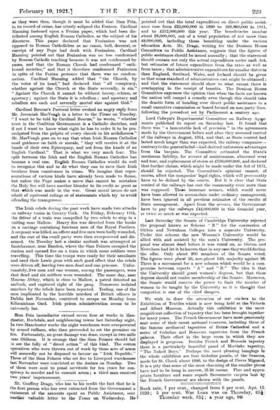Lord Colwyn's Departmental Committee on Railway Ager- merits published its
report on Saturday last. It found that there was " a lamentable leek of precision " in the agreements made by the Government before and after they assumed control of the railways in August, 1914, and that, as State control had lasted much longer than was expected, the railway companies— contrary to the general belief—had derived unforeseen advantages from the bargain. The Committee estimated the State's maximum liability, for arrears of maintenanoe, abnormal wear and tear, and replacement of stores at £150,000,000, and declared that further claims, which might be made under the Act of 1871, should be rejected. The Committee's opinions cannot, of course, affect the companies' legal rights, which will presumably have to be defined by the courts. But it is clear that State control of the railways has cost the community even more than was supposed. These immense arrears, which would never have been allowed to accumulate under ordinary management, have been ignored in all previous estimates of the results of State management. Apart from the arrears, the Government have to pay the railways £44,000,000 in this financial year, or twice as much as was expected.


































 Previous page
Previous page